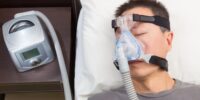What Is The Link Between Sleep Apnea And Weight Gain?

Sleep apnea is a common sleep disorder characterized by pauses in breathing or shallow breathing during sleep. It is often associated with various health complications, including weight gain. This article aims to explore the link between sleep apnea and weight gain, shedding light on the reciprocal relationship between the two.
Firstly, the article will provide an understanding of sleep apnea and its underlying causes.
Subsequently, it will delve into the relationship between sleep apnea and weight gain, highlighting the factors that contribute to weight gain in individuals with sleep apnea.
Additionally, the article will discuss the effects of weight gain on sleep apnea, emphasizing how excess weight can exacerbate the symptoms of this sleep disorder.
Furthermore, strategies for managing sleep apnea and weight gain will be explored, including the importance of healthy sleep habits and diet and exercise tips for weight management.
Finally, the article will underscore the significance of seeking professional help and support, as well as the long-term benefits of effectively managing both sleep apnea and weight gain.
Key Takeaways
- Sleep apnea can contribute to weight gain and obesity.
- Weight gain can worsen the symptoms of sleep apnea.
- Managing weight and adopting healthy lifestyle habits can improve sleep apnea symptoms.
- Treating sleep apnea through CPAP therapy can help prevent or reduce weight gain.
Understanding Sleep Apnea
Sleep apnea is a sleep disorder characterized by repeated interruptions in breathing during sleep, which can lead to a variety of health complications. It is estimated that approximately 22 million adults in the United States suffer from sleep apnea.
The condition occurs when the upper airway becomes partially or completely blocked, causing a temporary pause in breathing. These interruptions can last for a few seconds to a few minutes and can occur multiple times throughout the night.
Sleep apnea can have several negative effects on overall health, including excessive daytime sleepiness, decreased cognitive function, and an increased risk of cardiovascular diseases. Additionally, recent research has suggested a link between sleep apnea and weight gain.
Some studies have shown that individuals with sleep apnea are more likely to be overweight or obese, and weight loss can significantly improve symptoms of the disorder. While the exact mechanisms behind this association are still not fully understood, it is believed that the disrupted sleep patterns caused by sleep apnea may contribute to weight gain through various physiological and behavioral pathways.
Overall, understanding the relationship between sleep apnea and weight gain is crucial for developing effective prevention and treatment strategies for individuals affected by this disorder.
The Relationship Between Sleep Apnea and Weight Gain
Obstructive sleep apnea has been found to be strongly associated with an increase in body mass, which can be attributed to various factors such as disrupted sleep patterns and hormonal imbalances.
Sleep apnea can disrupt the normal sleep cycle, causing frequent awakenings throughout the night. This leads to sleep deprivation and fatigue, which can result in decreased physical activity and increased calorie intake.
Additionally, sleep apnea can affect the regulation of hormones involved in appetite control, such as leptin and ghrelin. Leptin, responsible for signaling satiety, is often decreased in individuals with sleep apnea, leading to increased hunger and overeating. On the other hand, ghrelin, responsible for stimulating hunger, is often increased in sleep apnea patients, further contributing to weight gain.
These factors create a vicious cycle where sleep apnea can lead to weight gain, and excess weight can worsen the severity of sleep apnea.
Effects of Weight Gain on Sleep Apnea
The effects of weight gain on sleep apnea can lead to an increased severity of the condition. As individuals gain weight, the excess fat can accumulate in the upper airway, causing the airway to become narrowed or blocked during sleep. This can result in more frequent and severe episodes of apnea, where breathing is temporarily stopped or significantly reduced.
Weight gain can also worsen the symptoms of sleep apnea. Individuals may experience louder and more frequent snoring, excessive daytime sleepiness, and difficulty concentrating. Additionally, weight gain can negatively impact the quality of sleep, leading to more disrupted and fragmented sleep patterns.
Overall, weight gain plays a significant role in the progression and impact of sleep apnea, with increased severity, worsened symptoms, and reduced quality of sleep being notable consequences.
Increased Severity of Sleep Apnea
Increased severity of sleep apnea is associated with higher body mass index and greater weight gain over time. Research studies have consistently shown a positive correlation between weight gain and the worsening of sleep apnea symptoms.
One study conducted on a large sample of adults found that individuals with a higher body mass index experienced more severe sleep apnea compared to those with a lower body mass index.
The relationship between weight gain and sleep apnea severity is thought to be due to the excess fat deposits around the upper airways, which can narrow the air passage and contribute to the collapse of the airway during sleep.
Additionally, weight gain can also lead to increased inflammation, hormonal changes, and altered respiratory control, all of which can further exacerbate sleep apnea.
Therefore, it is crucial for individuals with sleep apnea to manage their weight to minimize the severity of their condition.
Worsening of Symptoms and Quality of Sleep
One factor that significantly impacts the severity of sleep apnea symptoms and the quality of sleep is the worsening of symptoms over time. As sleep apnea progresses, the frequency and duration of apnea events tend to increase, leading to more disrupted sleep patterns. This can result in excessive daytime sleepiness, fatigue, and cognitive impairment.
Additionally, the worsening of symptoms can also lead to an increase in the severity of other associated health problems, such as cardiovascular disease, hypertension, and diabetes. The relationship between sleep apnea and weight gain is bidirectional, as weight gain can contribute to the development and progression of sleep apnea, and sleep apnea can further exacerbate weight gain.
Therefore, it is crucial for individuals with sleep apnea to seek appropriate treatment to prevent the worsening of symptoms and to improve overall sleep quality.
Strategies for Managing Sleep Apnea and Weight Gain
Strategies for managing sleep apnea and weight gain involve implementing lifestyle changes to address both conditions simultaneously. By adopting these strategies, individuals can not only improve their overall health but also reduce the severity of their sleep apnea symptoms. Here are four effective approaches:
- Weight loss: Shedding excess pounds can significantly alleviate sleep apnea symptoms. Even a modest weight loss can lead to improved breathing during sleep.
- Regular exercise: Engaging in physical activity on a regular basis can help maintain a healthy weight and improve sleep quality. It is recommended to incorporate both aerobic exercises and strength training into the routine.
- Healthy diet: Consuming a balanced diet rich in fruits, vegetables, whole grains, and lean proteins can support weight management and reduce the risk of sleep apnea.
- Avoiding alcohol and sedatives: These substances can relax the throat muscles and contribute to sleep apnea episodes. It is crucial to limit or avoid their consumption, especially before bedtime.
By implementing these strategies, individuals can effectively manage both sleep apnea and weight gain, leading to better overall health and quality of life.
Importance of Healthy Sleep Habits
The significance of maintaining healthy sleep habits cannot be overstated, as it plays a crucial role in promoting overall well-being and fostering a sense of vitality and rejuvenation.
Healthy sleep habits are especially important for individuals with sleep apnea, as this condition can disrupt the normal sleep cycle and lead to various health issues, including weight gain.
Poor sleep quality and sleep deprivation have been linked to increased appetite and cravings for high-calorie, unhealthy foods. Additionally, inadequate sleep can affect the balance of hormones that regulate hunger and satiety, such as leptin and ghrelin, leading to overeating.
Moreover, lack of sleep can impair glucose metabolism and insulin sensitivity, increasing the risk of developing obesity and related conditions.
Therefore, adopting and maintaining healthy sleep habits is crucial in managing sleep apnea and preventing weight gain.
Diet and Exercise Tips for Weight Management
Exercise and a balanced diet are key components in managing weight and promoting overall health. When it comes to weight management in individuals with sleep apnea, these factors become even more crucial.
Engaging in regular physical activity not only helps burn calories and increase metabolism, but it also improves sleep quality. Exercise reduces the severity of sleep apnea by strengthening the muscles in the throat and promoting better airflow.
Additionally, adopting a healthy diet can contribute to weight loss and improve sleep apnea symptoms. A diet rich in fruits, vegetables, lean proteins, and whole grains can help control weight gain and reduce the risk of sleep apnea-related complications.
It is important for individuals with sleep apnea to incorporate regular exercise and a balanced diet into their routine to effectively manage their weight and improve their overall health.
Seeking Professional Help and Support
In order to address sleep apnea effectively, individuals may consider consulting with a sleep specialist. These specialists are trained to diagnose and treat sleep disorders, including sleep apnea, and can provide personalized recommendations and treatment plans.
Additionally, joining support groups or programs specifically tailored to individuals with sleep apnea can provide a sense of community and shared experiences, as well as access to helpful resources and information.
Consulting with a Sleep Specialist
Consulting with a sleep specialist can provide valuable insights into the relationship between sleep apnea and weight gain. These specialists have the expertise to diagnose and treat sleep disorders, including sleep apnea, and can offer guidance on managing weight gain associated with the condition. Sleep specialists often conduct comprehensive evaluations, which may include a sleep study to assess the severity of sleep apnea. Through these assessments, they can determine the impact of sleep apnea on an individual’s sleep quality and overall health. Additionally, sleep specialists can provide personalized recommendations for weight management, such as lifestyle modifications or the use of continuous positive airway pressure (CPAP) therapy. By consulting with a sleep specialist, individuals can gain a better understanding of the link between sleep apnea and weight gain and receive appropriate treatment to improve their overall health.
| Relationship between Sleep Apnea and Weight Gain | ||||
|---|---|---|---|---|
| Sleep Apnea Severity | Weight Gain | |||
| Mild | Minimal to moderate weight gain | |||
| Moderate | Moderate weight gain | |||
| Severe | Significant weight gain | |||
| Treated with CPAP therapy | Weight gain may be prevented or reduced | Treated with CPAP therapy | Weight gain may be prevented or reduced, as CPAP therapy helps improve breathing during sleep and can alleviate symptoms of sleep apnea, such as daytime fatigue and excessive sleepiness. By improving sleep quality and reducing interruptions in breathing, CPAP therapy can also help regulate hormones involved in appetite control and metabolism, potentially reducing the likelihood of weight gain. Additionally, CPAP therapy can improve overall energy levels, making it easier for individuals to engage in regular physical activity and maintain a healthy weight. However, it is important to note that while CPAP therapy can be effective in managing weight gain associated with sleep apnea, lifestyle factors such as diet and exercise also play a significant role in weight management. |
Joining Support Groups or Programs
Participating in support groups or programs can provide individuals with a sense of community and emotional support, fostering a greater understanding of their experiences and the challenges associated with managing sleep apnea and its impact on weight. This involvement can offer various benefits that contribute to improved overall well-being:
- Shared experiences: Interacting with others who have similar struggles can help individuals feel less isolated, knowing they are not alone in their journey.
- Emotional support: Being part of a supportive group can provide a safe space for individuals to express their feelings, concerns, and frustrations, receiving empathy and encouragement from others who can relate.
- Practical advice: Support groups or programs often offer practical tips and strategies for managing sleep apnea and weight gain, providing individuals with valuable insights and resources.
- Accountability: Regular meetings and interactions within support groups can help individuals stay on track with their treatment plans, promoting adherence and accountability.
By participating in these groups or programs, individuals can gain valuable knowledge, emotional support, and motivation to effectively manage sleep apnea and its associated weight gain.
The Long-Term Benefits of Managing Sleep Apnea and Weight Gain
This discussion will focus on the long-term benefits of managing sleep apnea and weight gain, specifically in relation to improved sleep quality and daytime functioning as well as reduced risk of related health conditions.
By effectively managing sleep apnea and weight gain, individuals may experience better sleep quality, leading to improved daytime functioning and overall well-being.
Additionally, addressing these factors can help reduce the risk of developing related health conditions such as cardiovascular disease, diabetes, and hypertension.
Improved Sleep Quality and Daytime Functioning
Enhancing the quality of sleep and improving daytime functioning are key factors when addressing the link between sleep apnea and weight gain. Sleep apnea, a sleep disorder characterized by pauses in breathing during sleep, has been found to be associated with weight gain.
However, managing sleep apnea and achieving weight loss can lead to significant improvements in sleep quality and daytime functioning.
Research has shown that treating sleep apnea through continuous positive airway pressure (CPAP) therapy can result in improved sleep efficiency, reduced sleep fragmentation, and increased total sleep time. This is beneficial as it allows individuals to enter and maintain the deeper stages of sleep, which are essential for rest and restoration.
Additionally, treating sleep apnea can lead to reduced daytime sleepiness, enhanced cognitive function, and improved mood.
Overall, addressing sleep apnea and weight gain through appropriate interventions can have a positive impact on sleep quality and daytime functioning, ultimately contributing to better overall health and well-being.
Reduced Risk of Related Health Conditions
Reducing the incidence of associated health conditions is a significant benefit of addressing the relationship between sleep apnea and weight gain. Sleep apnea, a condition characterized by pauses in breathing during sleep, has been found to be closely linked with weight gain.
However, by addressing the underlying causes of sleep apnea, such as obesity, individuals can potentially reduce their risk of developing related health conditions. For example, studies have shown that weight loss can lead to improvements in sleep apnea symptoms and a reduction in the severity of the condition.
Additionally, addressing weight gain can also help reduce the risk of developing other health conditions associated with sleep apnea, such as cardiovascular disease, diabetes, and hypertension. Therefore, by addressing weight gain and improving overall health, individuals with sleep apnea can potentially reduce their risk of developing these related health conditions.
Frequently Asked Questions
What are the symptoms of sleep apnea?
Symptoms of sleep apnea include loud snoring, gasping for air during sleep, excessive daytime sleepiness, morning headaches, and difficulty concentrating. It is a sleep disorder characterized by pauses in breathing or shallow breaths due to blocked airways.
Can weight gain cause sleep apnea?
Weight gain can contribute to the development of sleep apnea. Excess weight can lead to an increase in fat deposits around the upper airway, narrowing the airway and causing breathing difficulties during sleep.
How can sleep apnea affect overall health?
Sleep apnea can have significant effects on overall health. It is associated with an increased risk of cardiovascular disease, hypertension, diabetes, stroke, and even premature death. Treatment can improve these health outcomes and quality of life.
Are there any natural remedies or lifestyle changes that can help with sleep apnea and weight gain?
Natural remedies and lifestyle changes, such as maintaining a healthy weight through diet and exercise, avoiding alcohol and sedatives, and practicing good sleep hygiene, can help alleviate symptoms of sleep apnea and prevent weight gain.
Can sleep apnea and weight gain be completely cured?
Sleep apnea and weight gain cannot be completely cured, but they can be effectively managed. Treatment options include continuous positive airway pressure (CPAP) therapy, weight loss through diet and exercise, and lifestyle changes such as avoiding alcohol and smoking.











